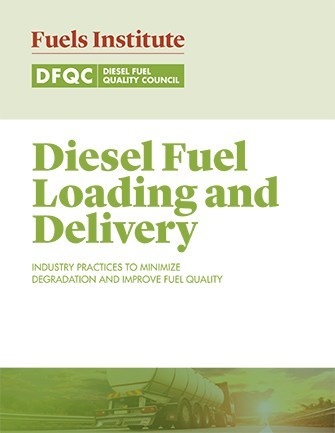ALEXANDRIA, Va., Aug. 31, 2021 /PRNewswire/ — This new resource, published by the Fuels Institute’s Diesel Fuel Quality Council (DFQC), contains a series of suggested practices to assist diesel fuel distributors – those transporting fuel from a distribution terminal to a retail or commercial facility storage tank – protect fuel quality while loading and unloading fuel. “Diesel Fuel Loading and Delivery: Industry Practices to Minimize Degradation and Improve Fuel Quality,” is an easy to read, step-by-step manual that walks diesel fuel distributors through practical solutions to address fuel quality and avoid costly contamination problems.
“In working with members of the Council, we identified fuel delivery to be one of the critical control points that could be improved by providing insight into the best industry practices to reduce comingling and potential contamination and thus help prevent negative impacts to equipment and engines,” said John Eichberger, executive director of the Fuels Institute. “This report has gone through exhaustive review to ensure that is represents valuable guidance that will have a significant positive influence on tank owners and vehicle operators.”
For years diesel fuel tank operators have been reporting increasing rates of equipment corrosion and degradation, resulting in costly remediation or equipment replacement. Meanwhile, fuel quality has become more of a concern to engine manufacturers and truck operators as they have experienced increasing rates of fuel-related issues with new high-pressure injection and aftertreatment systems developed to meet tightening fuel efficiency and emission standards. Fuel quality is the responsibility of the entire industry, from the refiner to the tank owner, and each segment of the supply chain should follow best practices to mitigate fuel quality concerns. By adopting the best practices found in the DFQC’s guidance document, diesel fuel distributors can do their part to preserve fuel quality.
This guidance document was extensively reviewed and approved by the Diesel Fuel Quality Council, which is comprised of engine manufacturers, refiners, biofuels producers, fleets, distributors, equipment producers, tank servicing experts and retailers alike. This process ensures this report presents the industry’s best practices a distributor can utilize to minimize degradation and contamination and therefore costly damage to fuel equipment and vehicles.
“Diesel Fuel Loading and Delivery: Industry Practices to Minimize Degradation and Improve Fuel Quality” was curated from reviewing leading recommended practices for distributors delivering both to underground storage tanks and aboveground storage tanks, as well as interviews with leading industry experts who have found success maintaining diesel fuel quality with innovative practices. By following the suggestions in the report, diesel fuel distributors may significantly minimize quality risks associated with transporting fuel and therefore, reduce costs associated with tank system repair, premature equipment replacement, and potential customer loss due to poor fuel quality.
For additional information, please contact Amanda Appelbaum at [email protected].
Related Images
SOURCE Fuels Institute

